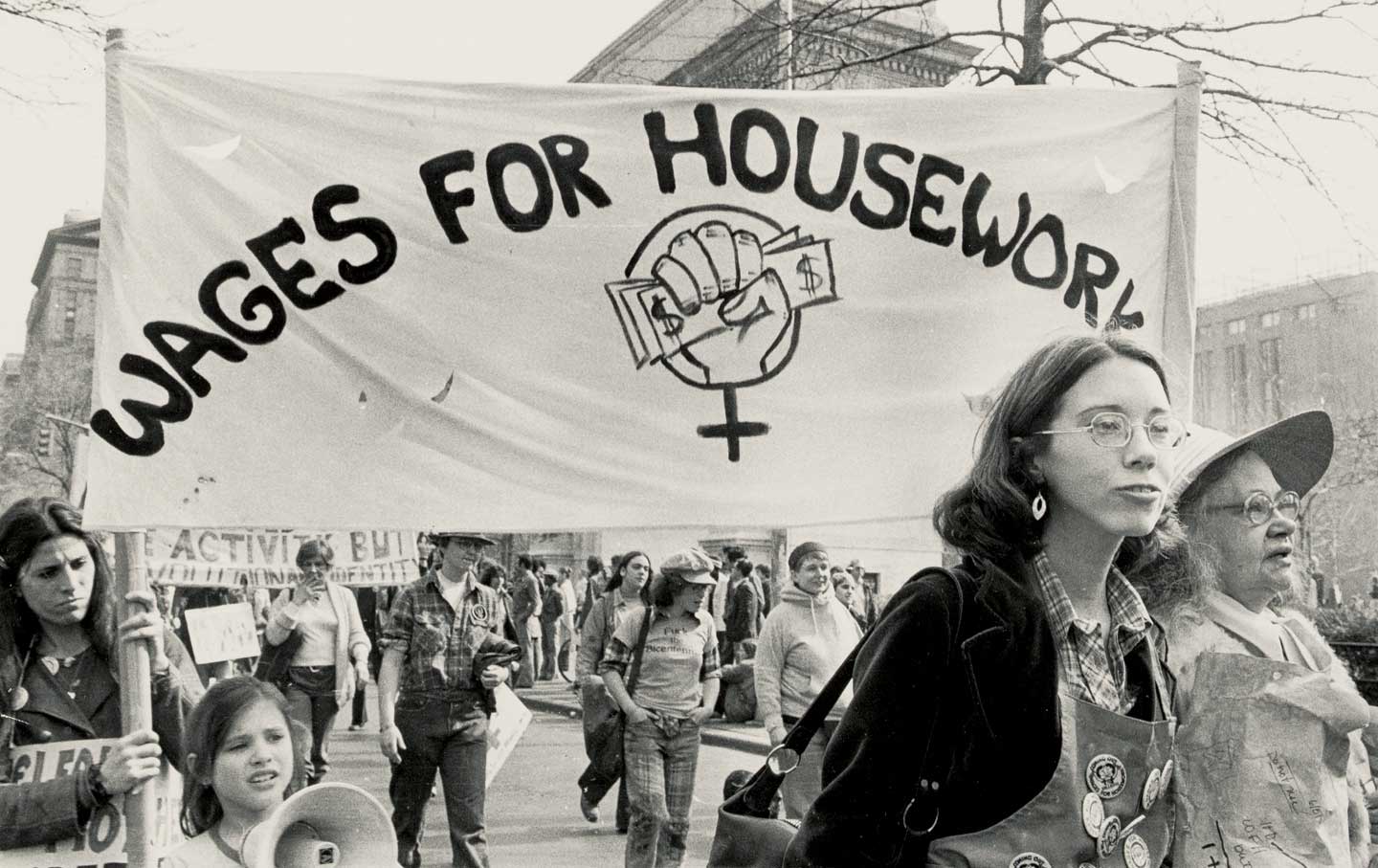A century's worth of "Food for Thought" from
one of America's most beloved writers.
Flaring headlines in the papers have announced that, "women will
fight to hold jobs," meaning the men's jobs which they took when the men went to war.
What to do about the situation seems a very important question.
One would think that there must have been great numbers of women who
were idle before the war. If not, one wonders what has become of the
jobs they had. To paraphrase a more or less popular song-
"I Wonder Who's Holding Them Now?"
In the kitchen with Lucy, Donna, and June in the post-war 1950's,
when homemaking was the preferred choice made by many women.
With men by the thousands out of work and the unemployment situation
growing so acute as to cause grave fears of attempted revolution, women by
the hundreds are further complicating affairs by adding their numbers to the
ranks of labor, employed, unemployed, or striking as the case may be.
We heard nothing of numbers of women who could not find work before
the war. They were all busy apparently and fairly well satisfied. Who is doing
the work they left to fill the places of men who went into the army, or
is that work undone? It would be interesting to know, and it seems strange
that while statistics are being prepared and investigations made of every
subject under the sun, no one has complied the records of,
"The Jobs Left or Women's Work Undone".
But however curious we may be about the past, we are more vitally
interested in the future. Will these women take up their old work and give
men a chance to go back to the places they will thus leave vacant?
The women say not.
Other women, also, besides those who took men's jobs, have gone out
of the places they filled in the pre-war days, out into the community and social
work and government positions which were created by and because of the war.
Will these women go back?
And again we hear them answer, "Never! We never will go back!"
All this is very well, but where are they going and with them all of us?
I think this query could most truthfully be answered by a slang expression,
which, though perhaps not polished, is very apt:
"We don't know where we're going but we're on our way."
"Wages For Housework" Rally
(1977)
It makes our hearts thrill and our heads rise proudly to think that women
were found capable and eager to do such important work in the crisis of
wartime days. I think that never again will anyone have the courage to say
that women could not run world affairs if necessary. Also, it is true that
when men and women have advanced, they do not go back.
History does not retrace its steps.
But this too is certain. We must advance logically, in order, and all
together if the ground gained is to be held. If what hitherto been women's work
in the world is simply left undone by them, there is no one else to take it up.
If in their haste to do other, perhaps more showy things, their old and special
work is neglected and only half done, there will be something seriously wrong
with the world, for the common place home work of women is the very
foundation upon which everything else rests.
Vintage Homemaking
"Helping Mommy Weed The Garden"
So if we wish to go more into world affairs, to have the time to work at
public work, we must arrange our old duties in some way so that it will be
possible. We cannot leave things at loose ends, no good housemother can
do that; and we have been good housekeepers so long that we have the
habit of finishing our work up neatly.
Women in towns and villages have an advantage over farm women in
being able to cooperate more easily. There is talk now of community kitchens
for them from which hot meals may be sent out to the homes. They have,
of course, the laundries and the bake shops already.
We farm women, at least farm mothers, have stayed on the job, our own job,
during all the excitement. We could not be spared from it, as we realized,
so there is no question of our going back or not going back. We are still
doing business at the old place, in the kitchen and garden and poultry
yard; and no one seems to be trying to take our job from us.
But we do not wish to be left too far behind our sisters in towns and cities.
We are interested in social and world betterment, in religion and politics,
we might even be glad to do some work as a side line that would give
us a change from the old routine. We would like to keep up, if any one
can keep up with these whirling times, and we must have more leisure
from the treadmill if we are to do any of these things.
We must arrange our work differently in some way. Why not a laundry
for a farm neighborhood and a bakery also, so situated that they will
be easily accessible to a group of farms?
Perhaps if we study conditions of labor and the forward movement of
the world as related to the farm, we may find some way of applying the
best of them to our own use.
"Women's Work"
(April 1919)
Laura Ingalls Wilder
(1867-1957)
Prolific American writer and pioneer girl
From the book,"Little House In The Ozarks
A Laura Ingalls Wilder Sampler
The Rediscovered Writings"
Laura Ingalls Wilder
Edited by Stephen W. Hines
1991 Guideposts Edition





No comments:
Post a Comment